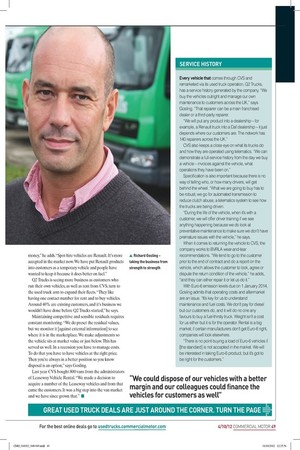SERVICE HISTORY
Page 40

If you've noticed an error in this article please click here to report it so we can fix it.
Every vehicle that comes through CVS and remarketed via its used truck operation, Q2 Trucks, has a service history generated by the company. “We buy the vehicles outright and manage our own maintenance to customers across the UK,” says Gosling. “That repairer can be a main franchised dealer or a third-party repairer.
“We will put any product into a dealership – for example, a Renault truck into a Daf dealership – it just depends where our customers are. The network has 140 repairers across the UK.” CVS also keeps a close eye on what its trucks do and how they are operated using telematics. “We can demonstrate a full-service history from the day we buy a vehicle – invoices against the vehicle, what operations they have been on.” Specification is also important because there is no way of telling who, or how many drivers, will get behind the wheel. “What we are going to buy has to be robust; we go for automated transmission to reduce clutch abuse, a telematics system to see how the trucks are being driven.
“During the life of the vehicle, when it’s with a customer, we will offer driver training if we see anything happening because we do look at preventative maintenance to make sure we don’t have premature issues with the vehicle,” he says.
When it comes to returning the vehicle to CVS, the company works to BVRLA wear-and-tear recommendations. “We tend to go to the customer prior to the end of contract and do a report on the vehicle, which allows the customer to look, agree or dispute the return condition of the vehicle,” he adds, “and they can either repair it or let us do it.” With Euro-6 emission levels due on 1 January 2014, Gosling admits that operating costs and aftermarket are an issue. “It’s key for us to understand maintenance and fuel costs. We don’t pay for diesel but our customers do, and it will do no one any favours to buy a fuel-thirsty truck. Weight isn’t a cost for us either but it is for the operator. Rental is a big market; if certain manufacturers don’t get Euro-6 right, companies will look elsewhere.
“There is no point buying a load of Euro-6 vehicles if [the standard] is not accepted in the market. We will be interested in taking Euro-6 product, but it’s got to be right for the customers.”










































